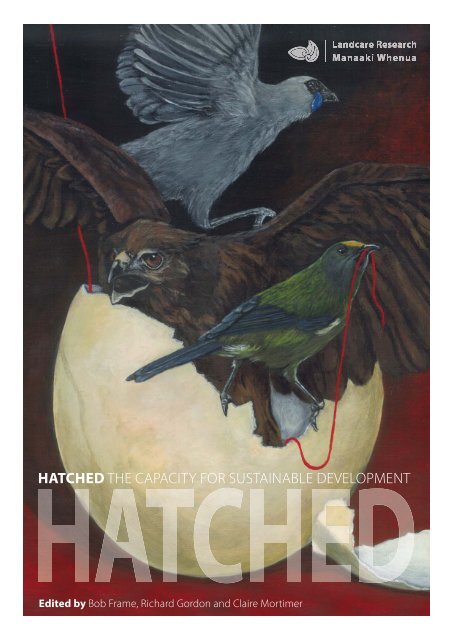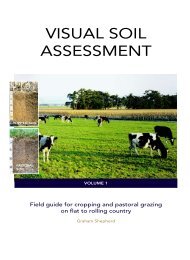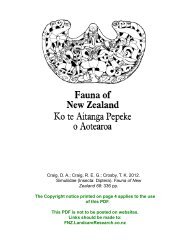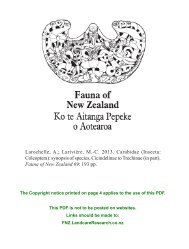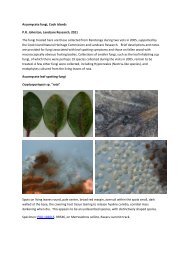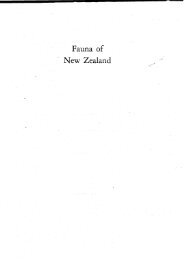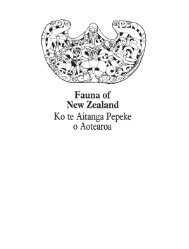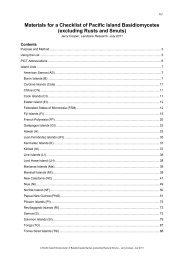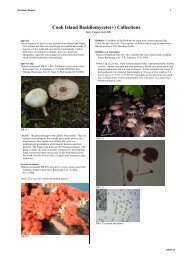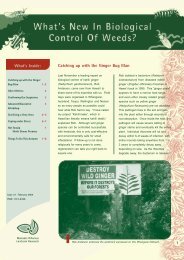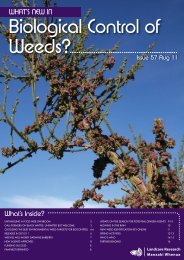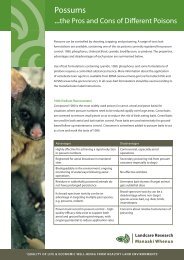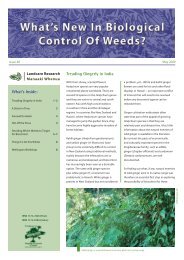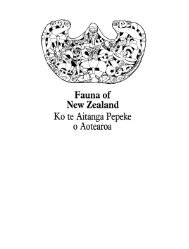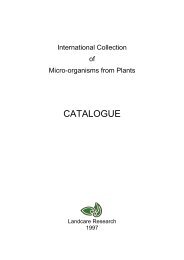Introduction - Landcare Research
Introduction - Landcare Research
Introduction - Landcare Research
You also want an ePaper? Increase the reach of your titles
YUMPU automatically turns print PDFs into web optimized ePapers that Google loves.
HATCHED THE CAPACITY FOR SUSTAINABLE DEVELOPMENT<br />
Edited by Bob Frame, Richard Gordon and Claire Mortimer
acknowledgements<br />
The core of the research reported in this e-book was supported through the Foundation for <strong>Research</strong>, Science and Technology project<br />
Building Capacity for Sustainable Development: The Enabling <strong>Research</strong> (C09X0310), which ran from October 2003 to September 2009.<br />
We have attempted to distil much of what we have learnt on this and associated projects so as to make it accessible to others: both those<br />
working and studying in this complex and emerging topic and those implementing the ideas and tools in their day-to-day working lives.<br />
However, we equally see our learnings as foundational for longer term research that will attempt to understand and deliver solutions<br />
for the benefi t of New Zealand and which will confi rm its reputation as an innovative, practical and future-oriented supporter of good<br />
science.<br />
In addition to the most welcome contributions from 30 authors, we must thank many colleagues for unstinting support during the<br />
project and the preparation of this book. Inadvertently we may well pass over those whose eff orts were critical to our success. However<br />
we specifi cally thank Alison Dalziel, Ann Magee, Louise Marra and Andy Pearce for their commitment and encouragement to the<br />
programme especially in its formative stages. We seek to thank everyone involved for many long days, creative tensions and runaway<br />
successes which have helped to take the thorny issue of research into sustainability to a new level in New Zealand. For the present<br />
though we owe a huge thank you to Christine Bezar and Nicollette Faville for taking our rough-hewn copy and breathing professional<br />
design into it. As a group we have enjoyed the support of Michael Krausse, Diane O’Connor and Tamsin Rees and many others who<br />
continue to make <strong>Landcare</strong> <strong>Research</strong> a unique institution in New Zealand in which to undertake this important work.<br />
Each chapter refl ects the authors’ work but also that of many others as researchers, participants, colleagues, contracting agents and<br />
stakeholders. While there are too many to thank individually, all 30 authors are grateful for the many contributions that lie behind<br />
these chapters and the many other activities that have taken place. However, the true test will be the resilience of these ideas and the<br />
continued support to really make a diff erence.<br />
The painting ‘Hatched’ by Penny Howard, illustrates the CS Lewis quote, that at a<br />
personal and collective level we need to transform states to both survive and reach our<br />
full potential. Three New Zealand birds; the songbirds Korimako and Kōkako and the<br />
farsighted Kāhu, are shown hatched but not quite taking fl ight. The red thread in Penny<br />
Howard’s paintings refers to bloodlines and I Nga Wa O Mua, the Maori world view, to<br />
look in front of us and to the past for guidance.<br />
Hatched i
list of contributors<br />
Wokje Abrahamse<br />
University of Otago, Wellington School<br />
of Medicine & Health Science<br />
P O Box 7343 Wellington South<br />
Will Allen<br />
Learning for sustainability<br />
will@learningforsustainability.net<br />
Jan Bebbington<br />
Professor, School of Accounting and<br />
Sustainable Development, and Director<br />
of the St Andrews Sustainability<br />
Institute, University of St Andrews,<br />
Scotland<br />
kjb10@st-andrews.ac.uk<br />
Melissa Brignall-Theyer<br />
<strong>Research</strong>er, <strong>Landcare</strong> <strong>Research</strong><br />
brignall-theyerm@landcareresearch.<br />
co.nz<br />
Helen Fitt<br />
<strong>Research</strong>er, <strong>Landcare</strong> <strong>Research</strong><br />
fi tth@landcareresearch.co.nz<br />
Bob Frame<br />
Principal Scientist – Sustainability &<br />
Society, <strong>Landcare</strong> <strong>Research</strong><br />
frameb@landcareresearch.co.nz<br />
Michael Fraser<br />
Lecturer, School of Accounting and<br />
Commercial Law, Victoria University<br />
of Wellington<br />
michael.fraser@vuw.ac.nz<br />
Chrys Horn<br />
Social Scientist/<strong>Research</strong>er<br />
chrys.horn@xtra.co.nz<br />
Richard Gordon<br />
General Manager – Environment &<br />
Society,<br />
<strong>Landcare</strong> <strong>Research</strong><br />
gordonr@landcareresearch.co.nz<br />
ii Hatched<br />
Judy Grindell<br />
PR Manager,<br />
<strong>Landcare</strong> <strong>Research</strong><br />
grindellj@landcareresearch.co.nz<br />
Kathryn Hailes<br />
Marketing and Communications<br />
Manager, carboNZero,<br />
<strong>Landcare</strong> <strong>Research</strong><br />
hailesk@landcareresearch.co.nz<br />
Garth Harmsworth<br />
<strong>Research</strong>er, <strong>Landcare</strong> <strong>Research</strong><br />
harmsworthg@landcareresearch.co.nz<br />
Megan Howell<br />
Tollemache Consultants<br />
mjhowell@ihug.co.nz<br />
Beat Huser<br />
Manager Sustainability Projects<br />
Environment Waikato<br />
Beat.Huser@ew.govt.nz<br />
Margaret Kilvington<br />
<strong>Research</strong>er, <strong>Landcare</strong> <strong>Research</strong><br />
Margaret.Kilvington@gmail.com<br />
Jonathan King<br />
<strong>Research</strong> Leader – Business,<br />
<strong>Landcare</strong> <strong>Research</strong><br />
kingj@landcareresearch.co.nz<br />
Jake McLaren<br />
Environmental Manager,<br />
Formway Furniture<br />
JakeM@formway.com<br />
Sarah McLaren<br />
Associate Professor in Life Cycle<br />
Management<br />
Massey University<br />
Sebastian Moff att<br />
President, CONSENSUS Institute<br />
seb.moff att@consensusinstitute.org<br />
Claire Mortimer<br />
Senior Analyst, <strong>Landcare</strong> <strong>Research</strong><br />
mortimerc@landcareresearch.co.nz<br />
Nick Potter<br />
Integrative <strong>Research</strong>er,<br />
Lichen:Collaboration<br />
nick@lichen.co.nz<br />
Stephanie Pride<br />
Principal Consultant, stratEDGY<br />
stephanie@stratedgy.co.nz<br />
Shona Russell<br />
<strong>Research</strong>er, <strong>Landcare</strong> <strong>Research</strong><br />
russells@landcareresearch.co.nz<br />
Daniel Rutledge<br />
Senior Scientist, <strong>Landcare</strong> <strong>Research</strong><br />
rutledged@landcareresearch.co.nz<br />
Barry Sadler<br />
Director of the International Association<br />
of Impact Assessment’s Eff ectiveness<br />
Review<br />
bsadler01@aol.com<br />
Ann Smith<br />
Technical and Certifi cation Manager,<br />
carboNZero, <strong>Landcare</strong> <strong>Research</strong><br />
smitha@landcareresearch.co.nz<br />
Rhys Taylor<br />
Sustainability Educator and Facilitator<br />
anneandrhys@clear.net.nz<br />
Martin Ward<br />
Environmental Advisor<br />
martinward@xtra.co.nz<br />
Liz Wedderburn<br />
Senior Scientist, Ag<strong>Research</strong><br />
liz.wedderburn@agresearch.co.nz<br />
Allen White<br />
Senior Fellow, Tellus Institute; Director,<br />
Corporation 20/20, Boston, USA<br />
awhite@tellus.org
contents<br />
Acknowledgements I<br />
List of contributors ii<br />
<strong>Introduction</strong> 1<br />
SECTION ONE—Thinking and acting for long-term success 3<br />
Chapter 1: New Zealand, new futures? 5<br />
Chapter 2: 100% Pure Conjecture – the Scenarios Game 17<br />
Chapter 3: The Auckland Sustainability Framework 23<br />
Chapter 4: Creating futures: integrated spatial decision support<br />
systems for local government 33<br />
Chapter 5: Successful cities in the 21st century 43<br />
SECTION TWO—Business as sustainability innovators 55<br />
Chapter 6: Foodmiles: fact or fi ction? 57<br />
Chapter 7: Changing the game: organisations and sustainability 67<br />
Chapter 8: Our journey from unsustainability: reporting about <strong>Landcare</strong> <strong>Research</strong> reports 77<br />
Chapter 9: Coming of Age: a global perspective on sustainability reporting 87<br />
Chapter 10: Sustainability and Māori business 95<br />
Chapter 11: Life Cycle Management 109<br />
Chapter 12: carboNZero 119<br />
Chapter 13: Greening the Screen 127<br />
Hatched iii
SECTION THREE—Individuals – as citizen consumers 133<br />
Chapter 14: Sustainable consumption 135<br />
Chapter 15 We are what we buy – aren’t we? 149<br />
Chapter 16: Seeking pro-sustainability household behaviour change 159<br />
Chapter 17: Supporting practice change through transformative communication 165<br />
Chapter 18: Education for sustainability in secondary schools 175<br />
SECTION FOUR—Facing up to wicked problems 185<br />
Chapter 19: Sustainability Technologies 101: ‘Wicked problems’ and other<br />
such technical terms<br />
187<br />
Chapter 20: Looking through a Governmentality lens – a bit more theory 197<br />
Chapter 21: Water allocation. Canterbury’s wicked problem 205<br />
Chapter 22: Social learning – a basis for practice in environmental management 215<br />
Chapter 23: Sustainability appraisal techniques 227<br />
Chapter 24: Getting under the bonnet. How accounting can help embed<br />
sustainability thinking into organisational decision making<br />
239<br />
Chapter 25: Stakeholder analysis 249<br />
Chapter 26: Supporting eff ective teamwork 255<br />
Chapter 27: We are not alone: National Sustainable Development approaches<br />
in New Zealand and Scotland<br />
261<br />
SECTION FIVE—The future as a set of choices 273<br />
Chapter 28: Sustainability: a conversation between business and science 275<br />
Chapter 29: Sustainable Development: responding to the research<br />
challenge in Aotearoa New Zealand<br />
287<br />
Unending 297<br />
iv Hatched
© <strong>Landcare</strong> <strong>Research</strong> New Zealand Ltd 2009<br />
This information may be copied and distributed to others without limitation, provided <strong>Landcare</strong> <strong>Research</strong><br />
New Zealand Ltd and the source of the information is acknowledged. Under no circumstances may a charge<br />
be made for this information without the written permission of <strong>Landcare</strong> <strong>Research</strong>.<br />
National Library of New Zealand Cataloguing-in-Publication Data<br />
Hatched : the capacity for sustainable development / edited by<br />
Bob Frame, Richard Gordon and Claire Mortimer.<br />
ISBN 978-0-473-16123-1 (internet)—ISBN 978-0-473-16124-8 (pbk.)<br />
1. Sustainable development—New Zealand. 2. Environmental<br />
protection—New Zealand. I. Frame, Bob. II. Gordon, Richard (Richard<br />
Francis Starforth), 1955- III. Mortimer, Claire. IV. Manaaki Whenua-<br />
<strong>Landcare</strong> <strong>Research</strong> New Zealand Ltd.<br />
338.9270993—dc 22<br />
ISBN 978-0-473-16123-1 (eBook)<br />
ISBN 978-0-473-16124-8 (print)<br />
Book design – Nicolette Faville<br />
Proof reading – Christine Bezar<br />
Cover Painting: ‘Hatched’ by Penny Howard<br />
Published by <strong>Landcare</strong> <strong>Research</strong> New Zealand Ltd<br />
PO Box 40, Lincoln, 7640<br />
January 2010
“It may be hard for an egg to turn into a bird: it would be a jolly sight harder for it to<br />
learn to fl y while remaining an egg. We are like eggs at present. And you cannot go on<br />
indefi nitely being just an ordinary, decent egg. We must be hatched or go bad.”<br />
introduction<br />
C. S. Lewis’s egg provides a metaphor for humanity’s defi ning<br />
choice: stay as we are and, through global resource depletion,<br />
climate change and social inequity, allow civilisation to crumble<br />
and decay, or, alternatively, transform and take fl ight.<br />
More than 30 years of scientifi c evidence shows the trajectory<br />
that the developed world and New Zealand have pursued up till<br />
now cannot be sustained. Over the last two years the warning<br />
signals have become increasingly tangible: the collapse of<br />
banking institutions worldwide, melting Arctic sea ice, volatile<br />
oil prices as global supplies diminish, and the risk of water wars,<br />
domestically and internationally, that hides deeper issues of<br />
food security.<br />
Developing new ways to live and do business will be the defi ning<br />
challenge of our age. Our last chance to hatch, or go bad…<br />
Sustainability and long-term success require substantial change<br />
throughout society. Six years ago New Zealand appeared to<br />
many to be, as Lewis warned, ‘an ordinary decent egg’. Some<br />
did not see any need to change, while others did not know<br />
where to start. In 2002, when editors Richard Gordon and Bob<br />
Frame designed the six-year research programme Building<br />
Capacity for Sustainable Development: the Enabling <strong>Research</strong>,<br />
we were guided by the government’s thinking on sustainable<br />
development, which was later published in Sustainable<br />
development for New Zealand: Programme of Action (DPMC<br />
2003). Our research programme, whose fi ndings are explored in<br />
this book, aimed to identify and develop the capabilities needed<br />
in New Zealand to meet the government’s call for ‘a diff erent way<br />
of thinking and working’ in order for New Zealand to achieve<br />
sustainable development.<br />
How is sustainable development defi ned in this book? There<br />
has been considerable debate over the concepts of strong<br />
and weak sustainability, and as a natural science institute we<br />
C. S. Lewis<br />
appreciate that socio-economic systems are fundamentally<br />
dependent on robust natural systems. But the chapters within<br />
this book provide more nuanced perspectives of sustainability.<br />
Māori self-determination and cultural resilience, for example,<br />
lie at the heart of many sustainable Māori business models,<br />
while an urban sustainability concept considers how to balance<br />
those elements of city systems that require long-term stability<br />
with elements that need to constantly adapt and change.<br />
Sustainability in this book is not tightly defi ned but is explored<br />
within diff erent contexts.<br />
Hatched also describes some of the many branches of research<br />
that grew from the Building Capacity programme. Principal<br />
among these were:<br />
• Regional futures: the development of three parallel projects:<br />
in the Waikato Region (integrated systems for decision<br />
support, Chapter 4), Canterbury Region (addressing the<br />
wicked problem of water as a constraining resource,<br />
Chapter 21), and the Marlborough Region (a network of<br />
champions for achieving carbon neutrality, which supported<br />
development of the EBEX21 and carboNZero programmes,<br />
Chapter 12)<br />
• Certifi cation standards: we believed that businesses and<br />
other organisations needed practical tools to achieve<br />
early wins (e.g. cost savings) and longer term, credible<br />
demonstration to their stakeholders of performance and<br />
integrity (carboNZero, Chapter 12, Greening the Screen,<br />
Chapter 13)<br />
• Māori business: in our view, founding businesses on<br />
indigenous people’s world views and values created a new<br />
business model that embodied many aspects of sustainable<br />
development (Chapter 10).<br />
Hatched provides some of the fi ndings, stories and tools
developed over the past six years. It’s an eclectic mix – ranging<br />
from an historical review of what creates successful cities, to a<br />
stakeholder evaluation tool, to new theoretical approaches, to<br />
understanding governance. Despite the diversity, fi ve thematic<br />
strands emerge from the research identifying key capacity<br />
needed for sustainability and forming the fi ve sections of the<br />
book.<br />
The fi rst section explores the need to think and act for longterm<br />
success. We often make decisions assuming the future will<br />
resemble the present, but a short review of history will remind<br />
us this is not so. How do we stretch thinking beyond our limited<br />
imagination for change, beyond immediate demands of the<br />
present? Government has a particular role here; the market,<br />
which we have increasingly relied upon to shape New Zealand,<br />
has neither memory nor foresight to do this. Its strength is its<br />
agility to adapt and innovate; but it is not the marketplace but<br />
society and government who will need to deliberately envision<br />
and create pathways to a desired future.<br />
The second section considers businesses as sustainability<br />
innovators. Businesses have the capability, creativity and<br />
resources to adapt and capitalise on future change and we<br />
found some of the most signifi cant shifts in the last six years<br />
within the business sector. Globally, sustainability reporting is<br />
now a mainstream management and communications tool for<br />
large companies – with nearly 80% of the largest 250 companies<br />
publishing reports. In New Zealand the development has<br />
been more tentative, but the rewards in overseas markets for<br />
businesses that engage with sustainability issues (climate change<br />
especially) has led many to be innovative in the product, service<br />
and business models.<br />
The third looks at individuals – as citizen consumers. Changing<br />
ourselves and how we live is extraordinarily complex. Our<br />
behaviour and consumption choices are infl uenced by our<br />
values, identity and knowledge, and by social norms and<br />
institutional constraints. Our research suggests that changing<br />
behaviours will require more than providing solid information.<br />
People need to learn from each other and create their own<br />
solutions. And at a fundamental level society will need to<br />
reactivate the concept of citizenship – of acting for the common<br />
good versus acting as the individual consumer.<br />
The fourth is facing up to wicked problems. The complexity and<br />
value-laden nature of many global change processes is proving<br />
too onerous for many tools developed for situations, for example,<br />
when resources were considered to be infi nite. Such problems<br />
are being characterised as ‘wicked’, or ‘super-wicked’ in the case<br />
of climate change. Facing up to wicked problems requires new<br />
ways of working and new modes of thinking. Our research opens<br />
up the diffi culty in achieving this, sketches some pathways<br />
forward and describes what those pathways might look like in<br />
practice.<br />
The fi fth and last section looks at the future as a set of choices. It<br />
is easier in the face of great challenges to believe in inevitability,<br />
safer to shuffl e deckchairs, more human to deny change is<br />
happening. It is a mark of leadership, however, to believe that<br />
we can make choices – especially when those choices are hard<br />
and require a fundamental review of our assumptions. New<br />
Zealand has enormous potential to determine its own future but<br />
only if it acts decisively and proactively. In this last section we<br />
consider the next steps for sustainable development both in New<br />
Zealand’s research and practice and beyond.<br />
The aim of this book is to provide a representation of research<br />
fi ndings in an accessible form for practitioners within the public,<br />
business and the wider community sectors. We hope readers<br />
will delve deeper into the academic papers listed at the end of<br />
each chapter. There is much more available on our website and<br />
we invite readers to contact our lead authors for our most recent<br />
work. General comments can be directed to buildingcapacity@<br />
landcareresearch.co.nz<br />
This book does not pretend to cover all aspects of sustainability.<br />
It leaves out many great ideas, experiments and successes. It<br />
does not address biophysical science, for example in climate<br />
change, biodiversity, soils, land and urban ecosystems; that is a<br />
feature of the work of New Zealand’s Crown <strong>Research</strong> Institutes.<br />
Instead our research has focused on supporting New Zealand’s<br />
and international capacity for sustainable development. We<br />
believe that capacity has now, in C.S. Lewis’s words, begun to<br />
hatch. We hope the insights within this book will continue to<br />
help individuals, organisations and communities to transition<br />
from the potential of the egg to the fl ight of the bird.<br />
Claire Mortimer, Richard Gordon and Bob Frame<br />
1 November 2009, Aotearoa New Zealand


